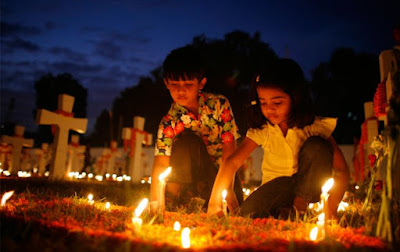GOD OF THE LIVINGS AND THE DEAD.
November 2, 2020
The Commemoration of All the Faithful Departed(All Souls)
A Spanish proverb says, “He who fears death cannot enjoy
life.” And a Native American Duwamish proverb adds, “There is no death, only a
change of worlds.”
Why does the Catholic Church pray for the dead? Is it not a
kind of necromancy or even sorcery to pray for the dead? These were questions
someone put to me one day while we were discussing faith, life, and death. He
even went farther, to speak of necrophily, that is, excessive love for the dead;
that, we Catholics seem to love the dead more than the livings. And he added,
once dead, nothing can be done for one’s conversion. So, it is while one is
still alive that he must plead for God's grace. He went beyond to quote Mark
12:27 where Jesus says, “He is not the God of the dead, but of the living.”
Reflecting on today's celebration, one could be tempted to
take back those interrogations and ask why do we commemorate our beloveds and
faithful departed? The Entrance Antiphon of this celebration gives the first
part of the answer: “Just as Jesus died and has risen again, so through Jesus
God will bring with him those who have fallen asleep; and as in Adam all die,
so also in Christ will all be brought to life.” That is what we believe, and
that is why we pray for our dead.
What we are celebrating today is not a grandiose funeral
mass, neither a revival of what we celebrated for each of our dead brothers and
sisters. We are professing our faith in the Resurrection of the dead, which we
say in the Credo. We know by faith that death is not an end by itself to life.
Death is just a step in our journey towards life, the journey towards God.
Therefore, our commemoration of the faithful departed is a song of triumph, a
proclamation of life that will prevail over death.
A Senegalese writer, Birago Diop chanted rightly this
victory of life in his poem, “The breath of the ancestors”, when he says:
“Hearing things more than beings, listening to the voice of fire, the voice of
water. Hearing in wind the weeping bushes, sighs of our forefathers. The dead
are never gone: they are in the shadows. The dead are not in earth: they're in
the rustling tree, the groaning wood, water that runs, water that sleeps,
they're in the hut, in the crowd, the dead are not dead. The dead are never
gone, they're in the breast of a woman, they're in the crying child, in the
flaming firebrand. The dead are not in earth: they're in the dying fire, the
weeping grasses, whimpering rocks, they're in the forest, they're in the house,
the dead are not dead.” In one word, our dead brothers and sisters surround us
and invoke our prayers on their behalf for a peaceful journey toward heaven.
Our close deceased members of our families are still remaining a part of our
living community, though in an invisible stand.
The word of God gives us today many options of reflection on
the reality of life. All the readings convey one message, the Resurrection, the
life in the glory of God. The book of Wisdom, for example, tells us that “The
souls of the just are in the hand of God, and no torment shall touch them.” God
is the one who cares for them and protects them. Thus, the song of the
Psalmist, “The Lord is my shepherd; there is nothing I shall want.” Though
while we live, we may face many hardships and trials, if we keep faithfulness
to the Lord, he will always keep his love for us, and care for us.
St. Paul, in the second reading, tells the faithful of Rome
that our salvation and reconciliation with God came through the one who died
for us. The Apostle encourages us to keep firm our faith in the Resurrection
and life in heaven. And he makes it a firm proclamation saying, “We know that
our old self was crucified with him, so that our sinful body might be done away
with, that we might no longer be in slavery to sin. For a dead person has been
absolved from sin. If then, we have died with Christ, we believe that we shall
also live with him. We know that Christ, raised from the dead, dies no more;
death no longer has power over him” (Rom 6:3-9). The Spirit of God, the Spirit
who raises Christ from death into newness of life will be always at work in us
for our own resurrection. This faith and hope, we share it with those who have
gone ahead of us. Here is a mystery that is hidden to those who make only use
of their logic reasoning and never go beyond scientific knowledge and proves.
Science is not all. For, science does not say everything about man, and about
life. May we say it right away, human science has its limits. When it reaches
matters of faith, the scientific evidences are worthless and insufficient. What
is needed is a firm belief. Faith does not deny science, but it proves it
limited.





Comments
Post a Comment